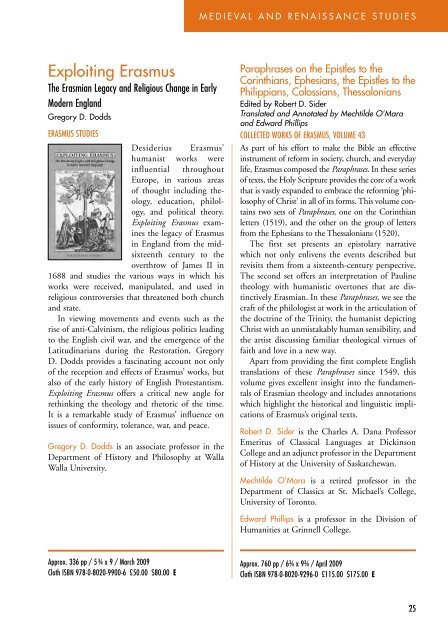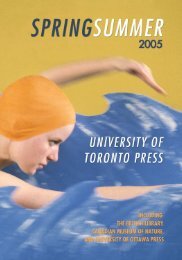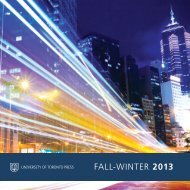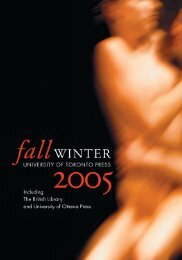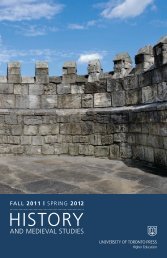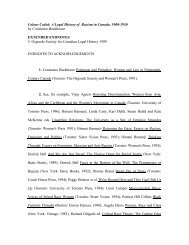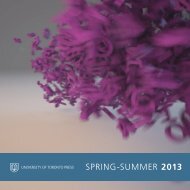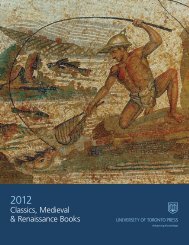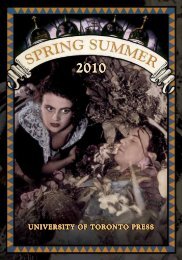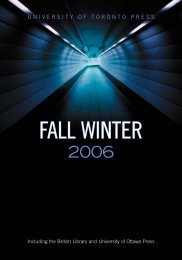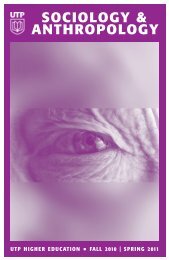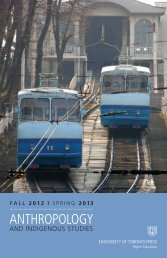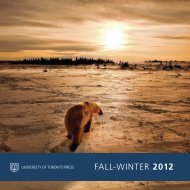Spring/Summer 2009 - University of Toronto Press Publishing
Spring/Summer 2009 - University of Toronto Press Publishing
Spring/Summer 2009 - University of Toronto Press Publishing
Create successful ePaper yourself
Turn your PDF publications into a flip-book with our unique Google optimized e-Paper software.
m e d i e va l a n d r e n a i s s a n c e s t u d i e s<br />
Exploiting Erasmus<br />
The Erasmian Legacy and Religious Change in Early<br />
Modern England<br />
Gregory D. Dodds<br />
Erasmus Studies<br />
Desiderius Erasmus’<br />
humanist works were<br />
influential throughout<br />
Europe, in various areas<br />
<strong>of</strong> thought including theology,<br />
education, philology,<br />
and political theory.<br />
Exploiting Erasmus examines<br />
the legacy <strong>of</strong> Erasmus<br />
in England from the midsixteenth<br />
century to the<br />
overthrow <strong>of</strong> James II in<br />
1688 and studies the various ways in which his<br />
works were received, manipulated, and used in<br />
religious controversies that threatened both church<br />
and state.<br />
In viewing movements and events such as the<br />
rise <strong>of</strong> anti-Calvinism, the religious politics leading<br />
to the English civil war, and the emergence <strong>of</strong> the<br />
Latitudinarians during the Restoration, Gregory<br />
D. Dodds provides a fascinating account not only<br />
<strong>of</strong> the reception and effects <strong>of</strong> Erasmus’ works, but<br />
also <strong>of</strong> the early history <strong>of</strong> English Protestantism.<br />
Exploiting Erasmus <strong>of</strong>fers a critical new angle for<br />
rethinking the theology and rhetoric <strong>of</strong> the time.<br />
It is a remarkable study <strong>of</strong> Erasmus’ influence on<br />
issues <strong>of</strong> conformity, tolerance, war, and peace.<br />
Gregory D. Dodds is an associate pr<strong>of</strong>essor in the<br />
Department <strong>of</strong> History and Philosophy at Walla<br />
Walla <strong>University</strong>.<br />
Paraphrases on the Epistles to the<br />
Corinthians, Ephesians, the Epistles to the<br />
Philippians, Colossians, Thessalonians<br />
Edited by Robert D. Sider<br />
Translated and Annotated by Mechtilde O’Mara<br />
and Edward Phillips<br />
Collected Works <strong>of</strong> Erasmus, Volume 43<br />
As part <strong>of</strong> his effort to make the Bible an effective<br />
instrument <strong>of</strong> reform in society, church, and everyday<br />
life, Erasmus composed the Paraphrases. In these series<br />
<strong>of</strong> texts, the Holy Scripture provides the core <strong>of</strong> a work<br />
that is vastly expanded to embrace the reforming ‘philosophy<br />
<strong>of</strong> Christ’ in all <strong>of</strong> its forms. This volume contains<br />
two sets <strong>of</strong> Paraphrases, one on the Corinthian<br />
letters (1519), and the other on the group <strong>of</strong> letters<br />
from the Ephesians to the Thessalonians (1520).<br />
The first set presents an epistolary narrative<br />
which not only enlivens the events described but<br />
revisits them from a sixteenth-century perspective.<br />
The second set <strong>of</strong>fers an interpretation <strong>of</strong> Pauline<br />
theology with humanistic overtones that are distinctively<br />
Erasmian. In these Paraphrases, we see the<br />
craft <strong>of</strong> the philologist at work in the articulation <strong>of</strong><br />
the doctrine <strong>of</strong> the Trinity, the humanist depicting<br />
Christ with an unmistakably human sensibility, and<br />
the artist discussing familiar theological virtues <strong>of</strong><br />
faith and love in a new way.<br />
Apart from providing the first complete English<br />
translations <strong>of</strong> these Paraphrases since 1549, this<br />
volume gives excellent insight into the fundamentals<br />
<strong>of</strong> Erasmian theology and includes annotations<br />
which highlight the historical and linguistic implications<br />
<strong>of</strong> Erasmus’s original texts.<br />
Robert D. Sider is the Charles A. Dana Pr<strong>of</strong>essor<br />
Emeritus <strong>of</strong> Classical Languages at Dickinson<br />
College and an adjunct pr<strong>of</strong>essor in the Department<br />
<strong>of</strong> History at the <strong>University</strong> <strong>of</strong> Saskatchewan.<br />
Mechtilde O’Mara is a retired pr<strong>of</strong>essor in the<br />
Department <strong>of</strong> Classics at St. Michael’s College,<br />
<strong>University</strong> <strong>of</strong> <strong>Toronto</strong>.<br />
Edward Phillips is a pr<strong>of</strong>essor in the Division <strong>of</strong><br />
Humanities at Grinnell College.<br />
Approx. 336 pp / 5¾ x 9 / March <strong>2009</strong><br />
Cloth ISBN 978-0-8020-9900-6 £50.00 $80.00 E<br />
Approx. 760 pp / 6¾ x 9¾ / April <strong>2009</strong><br />
Cloth ISBN 978-0-8020-9296-0 £115.00 $175.00 E<br />
25


